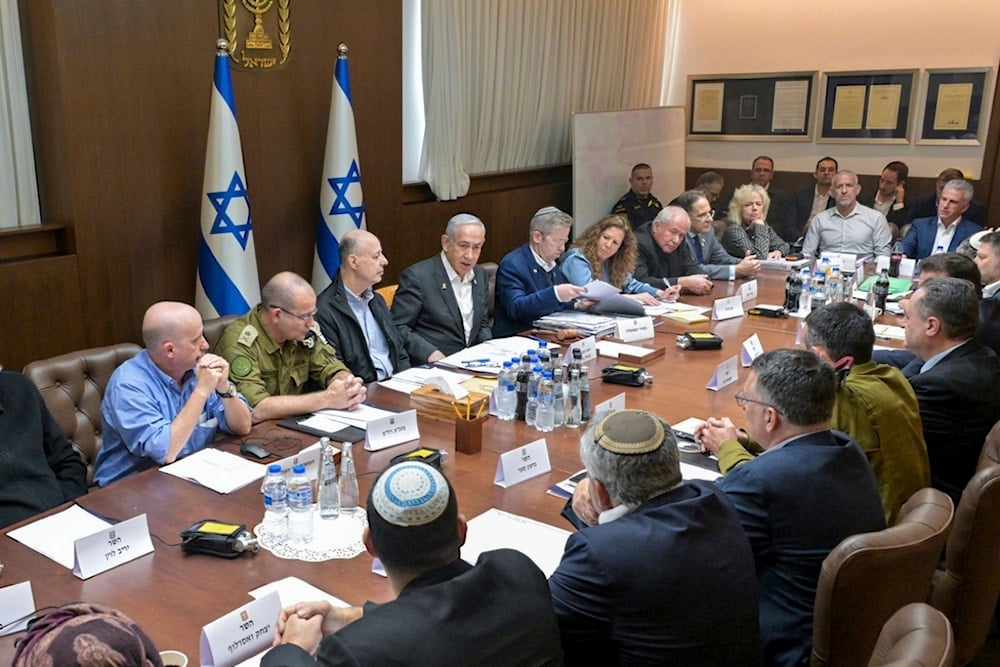'Major disagreements' between IOF, Cabinet over Gaza war policy
Disputes within the Israeli Security Cabinet reveal deep divisions between political leaders and the military.
-

In this photo provided by the Israeli Government Press Office, Israeli Prime Minister Benjamin Netanyahu, center, convenes his Security Cabinet to vote on a ceasefire deal with Hamas in occupied al-Quds, Jan. 17, 2025 (Israeli Government Press Office via AP, File)
Meetings of the Israeli Security Cabinet have exposed "major disagreements" between the political leadership and military officials over the policies of Prime Minister Benjamin Netanyahu’s government regarding the war on Gaza, Israeli media reported.
These disagreements resurfaced during the latest cabinet meeting held on Thursday evening, which concluded without any official statement.
This followed a similar inconclusive meeting held on Tuesday evening. The Israeli Security Cabinet is set to reconvene next Monday in an attempt to bridge the political-military tensions over the conduct of the war on Gaza and the distribution of humanitarian aid provided by foreign parties to Palestinians in the Strip.
Disagreements over humanitarian aid distribution in Gaza
On Friday, the Israeli newspaper Israel Hayom reported that Thursday’s meeting witnessed major disagreements between the military establishment and the political leadership.
Despite some progress on the method of distributing humanitarian aid in Gaza, serious disputes re-emerged over the future direction of the military operations.
The newspaper noted that these disagreements specifically relate to “the next stages of the military campaign,” referring to the genocidal war that the Israeli regime has been waging against the Gaza Strip for 19 months.
Read more: Ex-Israeli PM Barak calls Gaza war 'futile', politically motivated
Israeli military forced to revise war plans amid Cabinet disputes
During the session, a “sharp verbal altercation” reportedly broke out between military leaders and government ministers, with raised voices marking the intensity of the debate, Israel Hayom mentioned.
According to the Israeli newspaper, the failure to reach an agreement on the course of the war against Gaza has led the Israeli military to revisit and revise its plans, aiming to align with the government’s political approach.
Since March 2, the Israeli occupation military has closed the Gaza Strip’s crossings to food, relief, medical aid, and goods, significantly worsening the humanitarian situation for Palestinians, according to government, human rights, and international reports.
Extremist ministers oppose any aid to Gaza
While the Israeli government claims it aims to prevent aid from reaching Hamas, the Israeli military has raised concerns that distributing aid poses risks. Extremist ministers, including Finance Minister Bezalel Smotrich, have insisted that no aid should be allowed into Gaza at all.
In this context, Israel Hayom reported that the Israeli army presented new plans designed to ensure that humanitarian aid cannot be accessed by Hamas. These plans were also structured to minimize risks to Israeli soldiers if they are tasked with distributing supplies.
However, the newspaper did not disclose specific details about these new military plans.
WFP says it has run out of food in Gaza
The United Nations World Food Programme (WFP) announced Friday that it has fully exhausted its food supplies for families in Gaza.
“Today, WFP delivered its last remaining food stocks to hot meals kitchens in the Gaza Strip. These kitchens are expected to fully run out of food in the coming days,” the UN agency stated.
For weeks, these hot meals kitchens have served as the only consistent source of food aid for the population. Although they reached only half of Gaza’s residents and met just 25% of their daily nutritional needs, they remained a critical lifeline, WFP noted.
WFP has fully depleted its food stocks in #Gaza.
— World Food Programme (@WFP) April 25, 2025
Today, the last supplies were delivered to hot meal kitchens — Gaza’s only steady source of food for weeks. These kitchens will run out of ingredients in the coming days.
Read full statement.🔗https://t.co/OQCpJQcMfg pic.twitter.com/QaXY5CsbHx
All 25 bakeries supported by the WFP were forced to shut down on March 31 due to the depletion of wheat flour and cooking fuel. That same week, WFP's distribution of food parcels—each containing two weeks' worth of supplies per family—also came to an end.
“WFP is also deeply concerned about the severe lack of safe water and fuel for cooking – forcing people to scavenge for items to burn to cook a meal,” the statement said.
It further noted that "this is the longest closure" the Gaza Strip has experienced, severely undermining already fragile markets and food systems.
The WFP emphasized that food prices have surged by as much as 1,400% compared to levels during the ceasefire, while essential commodities remain scarce.
It underscored that these conditions have raised serious concerns about malnutrition, particularly among vulnerable groups such as children under five, pregnant and breastfeeding women, and the elderly.
The agency asserted that more than 116,000 metric tonnes of food assistance—sufficient to feed one million people for up to four months—are currently positioned at aid corridors and ready to be delivered by WFP and its partners as soon as "Israel" reopens the crossings.
“The situation inside the Gaza Strip has once again reached a breaking point," WFP warned. "People are running out of ways to cope, and the fragile gains made during the short ceasefire have unravelled.”ress made during the brief ceasefire has been lost.”
The agency called on all parties to prioritize the needs of civilians, allow the immediate entry of humanitarian aid into Gaza, and uphold their obligations under international humanitarian law.
Read more: Gaza starves under Israeli blockade as aid runs dry, prices soar

 5 Min Read
5 Min Read








